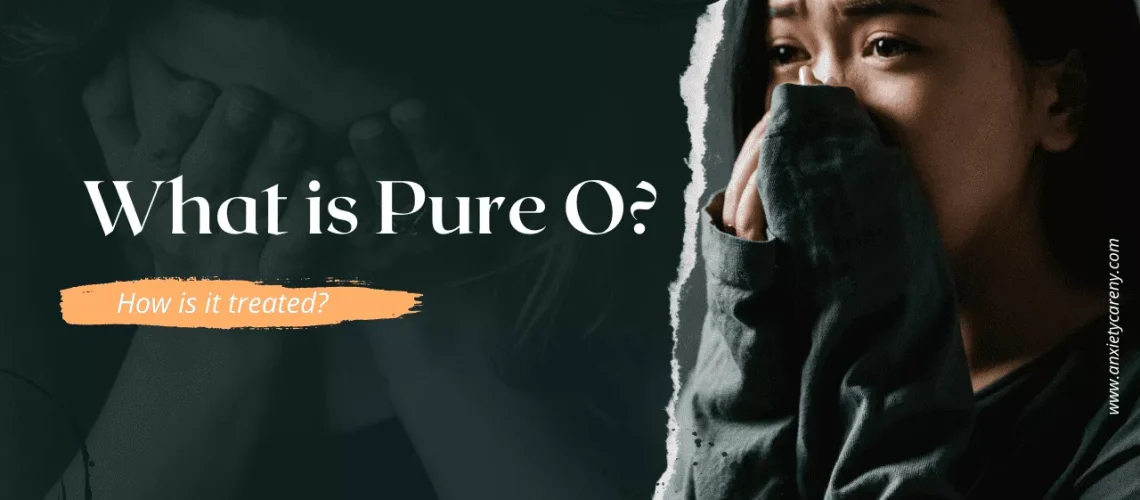You may have encountered the term “Pure O” in your search for OCD treatment. The label “Pure O” is somewhat misleading because all types of OCD, including “Pure O” OCD, include compulsions.
People with Pure O also have unwanted and troubling thoughts, like others with OCD. However, the compulsions (the things they do to try to feel better) are mainly in their minds, and these mental compulsions might not be evident to others. These mental compulsions may include reviewing past events, reassuring themselves, or analyzing their thoughts. Even though these mental compulsions aren’t visible, they still significantly impact a person’s life and can cause great distress.
People with Pure O often have unwanted thoughts or images about taboo or unwanted subjects, such as violence, sex, or blasphemous religious content. For example, someone with Pure O might worry about the possibility of hurting someone they love, even though they don’t want to. These thoughts can be very distressing and scary, but it’s essential to know that an OCD specialist won’t judge you for the content of your thoughts. They understand that the brain can create strange thoughts and that these thoughts don’t define you as a person.

Common OCD Themes:
- Intrusive thoughts about harming oneself or others
- Intrusive thoughts about abhorrent sexual activity, such as pedophilia or incest
- Doubt about one’s sexual orientation
- Doubt about one’s romantic partner
- Fear that you have upset or offended others
- Fear of harming yourself, a loved one, or a stranger
- Doubt about your sexual orientation
- Fear of being contaminated by germs or dirt
- Fear of losing control and acting on violent impulses
- Fear of developing psychosis or other serious mental illness
- Fear that one will never be able to stop noticing certain bodily sensations (e.g., breathing or seeing one’s own nose)
- Fear of being responsible for something terrible happening
- Fear of losing control and blurting out obscenities, racial slurs, or insults
- Fear of making the “wrong” decisions (both trivial and significant)
Common Mental Compulsions:
- Reciting specific phrases or prayers
- Counting items or occurrences
- Examining one’s body for symptoms of illness or arousal.
- Self-reassurance
- Suppressing or neutralizing intrusive thoughts with alternative thoughts or actions
- Avoiding situations or material that provoke intrusive thoughts.
- Mentally evaluating actions, thoughts, intentions, feelings, and beliefs to ensure appropriateness.
- Reflecting on and scrutinizing past events for evidence of wrongdoing
- Considering and mentally preparing for “what if” scenarios
- Contemplating the meaning of having individual thoughts, feelings, sensations, or images
- Overanalyzing existential matters or life concerns
- Resenting or wishing away intrusive thoughts
- Comparing one’s life to the pre-OCD period
- Judging and interpreting the significance of intrusive thoughts

How does ERP for Pure O work?
Exposure and Response Prevention (ERP) is one of the best treatments for Pure O. The goal of ERP for OCD is to help individuals confront intrusive thoughts and triggers and see that they are not inherently dangerous. ERP enables you to learn that you can cope with these thoughts and images without engaging in compulsions. When you can reduce mental compulsions, you remove some of the fuel that keeps the OCD going and begin to experience some relief. Learn more about the basics of ERP here.
ERP for harm OCD, for example, involves facing fears about physically harming oneself or others. ERP for harm themes may include exposure to the avoided intrusive thoughts or to real-life situations that trigger the feared thoughts.
Some examples of ERP for harm OCD may include:
- Reading an index card that says, “I am not sure if I may harm someone one day.”
- Holding a knife or other sharp object
- Watching a movie or reading a news article involving harm or violence
- Spending time with a loved one and intentionally bringing up intrusive thoughts about violence without seeking reassurance
- Visiting a place or engaging in an activity that triggers harm-related thoughts, such as driving a car or cooking
Practicing exposure will likely bring up feelings of anxiety, uncertainty, and doubt. Refraining from trying to reduce these feelings with your typical mental or physical behaviors is essential. The OCD specialist will talk you through resisting the urge to engage in mental rituals and practice alternative responses to your intrusive thoughts and anxious feelings. As you progress through the therapy, you become more comfortable facing your intrusive thoughts and learn you can tolerate the anxiety without resorting to compulsions.
It’s essential to remember that the goal of ERP therapy is not to eliminate unwanted thoughts; that is not possible. Instead, ERP aims to change your relationship with these thoughts. By learning to tolerate the discomfort associated with intrusive thoughts and refrain from engaging in mental compulsions, individuals with Pure O can gain more control over their OCD symptoms and reduce the impact of intrusive thoughts on their daily lives.
Mindfulness and acceptance techniques, such as Acceptance and Commitment Therapy (ACT), can also be integrated into the treatment process to help individuals with Pure O develop a non-judgmental and accepting stance toward their thoughts. This approach encourages clients to observe their thoughts neutrally without getting caught up in them and swept away into OCD land.
Do I Need to Work with a Pure O Specialist?
When looking for Pure O therapy, finding someone with specific experience in this area is crucial. The provider should have a deep understanding of working with mental rituals and be able to guide you through the process of ERP with empathy and care. It is okay to ask potential therapists about their experience and training in treating Pure O and their approach to implementing ERP and other complementary techniques. See this article for more on finding a Pure O therapist.
Will ERP be effective for my OCD Subtype?
ERP can be tailored to a wide variety of OCD themes. ERP therapists recognize that the content of the obsession is interchangeable, and treatment is essentially the same for various OCD themes. For instance, ERP for sexual orientation OCD may involve exposures related to unwanted sexual thoughts and refraining from checking behaviors. ERP for religious scrupulosity might include confronting blasphemous thoughts or engaging in activities that challenge strict religious beliefs.
If you are struggling with Pure O, seeking treatment is the first step towards overcoming intrusive thoughts and regaining control of your life. Consider ERP for OCD and find a qualified OCD therapist to guide you. With the proper treatment and support, you can overcome Pure O and live a fulfilling life. By gaining skills to manage your symptoms effectively, you can break free from the cycle of obsessions and compulsions and experience a life where you are in the driver’s seat.
Please get in touch with us to learn more about our OCD treatment in NY.

